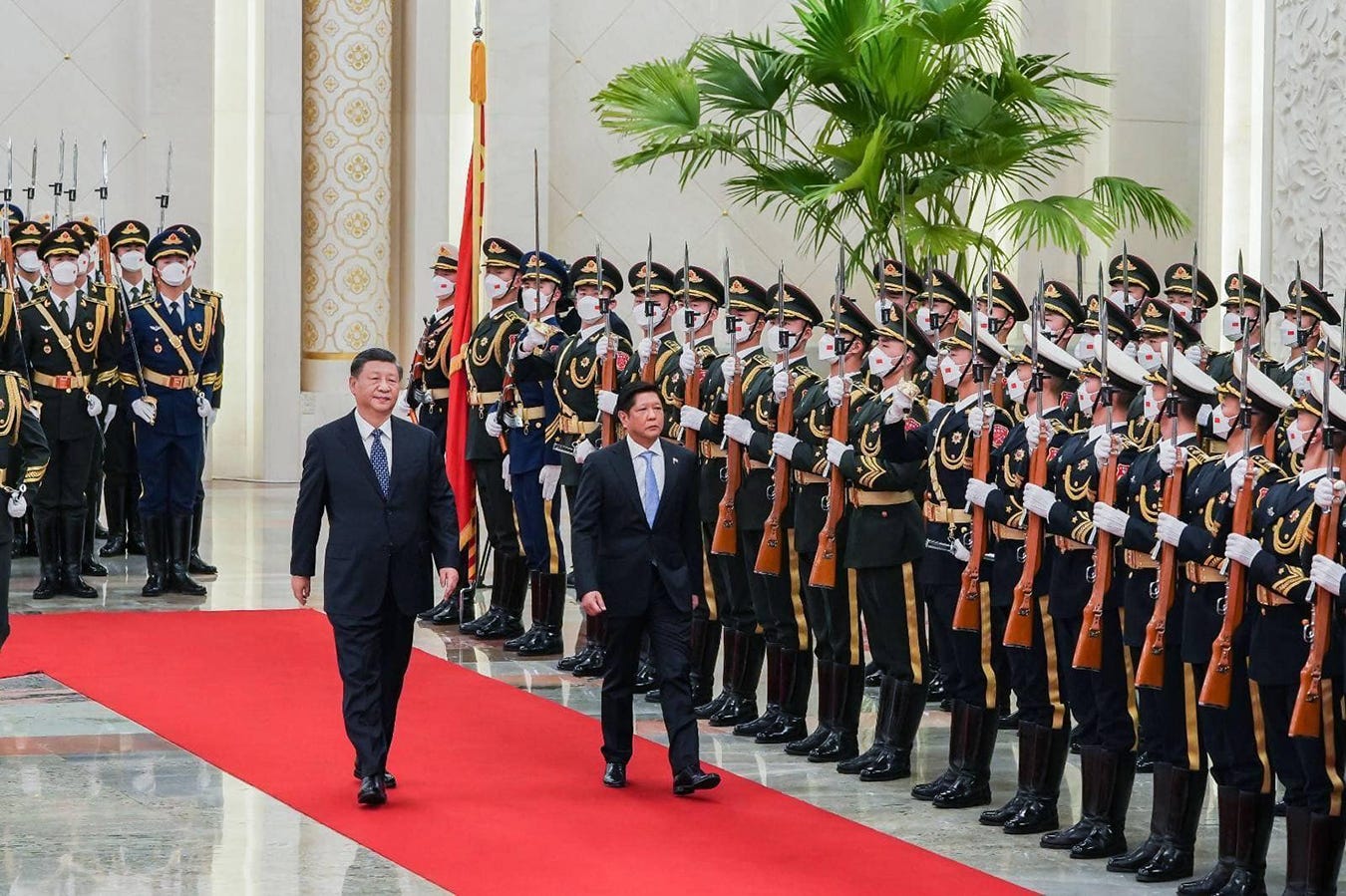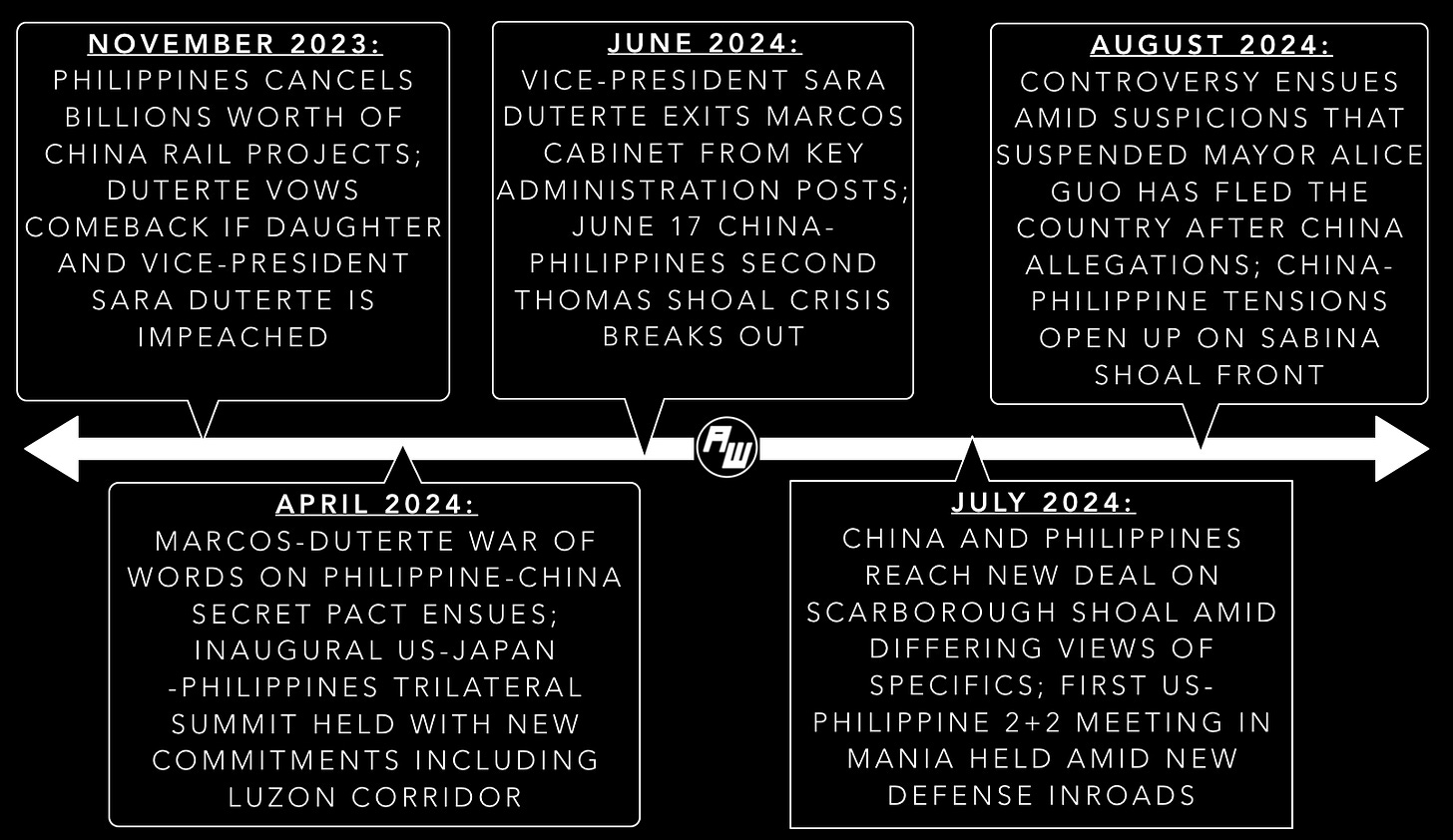Review: Philippines China Policy Under Marcos and Beyond
From influence operations to South China Sea tensions, a closer look at Philippines China policy under Ferdinand Marcos Jr after Rodrigo Duterte's pivot quest.
A new book details the geopolitical stakes at play amid one of Southeast Asia's most dramatic U.S.-China alignment storylines, with implications across realms from minilaterals to flashpoints such as the South China Sea and Taiwan.
WonkCount: 1,689 words (~8 minutes)
Review: Philippines China Policy Under Marcos and Beyond
Context
“We are now more conscious as a people, and strategic in heightening our aerial and maritime domain awareness,” Philippine President Ferdinand Marcos Jr. declared in the South China Sea portion of his annual state of the nation address in July1. As we have been noting here on ASEAN Wonk including in our new podcast, the increasing consciousness Marcos referred to is due in no small part to ex-president Rodrigo Duterte’s past gamble of tilting a longtime U.S. treaty ally towards China in exchange for benefits that data show failed to materialize2. Amid Sino-Philippine South China Sea clashes and Marcos-Duterte tensions ahead of 2025 midterm polls — as we saw firsthand during a visit to Duterte’s stronghold of Davao earlier this year — it also speaks to the evolving question of how successful Philippine leaders may be in forging a foreign policy that both manages domestic political divisions at home and extracts the most benefits for the country’s interests abroad. Indeed, put bluntly, one does not have to buy into false U.S.-China equivalence narratives to see that if Duterte’s single, six-year term was a test of the value of leaning closer to Beijing, then Marcos’ term is a test of the value of tilting further in the direction of Washington3.
Select Recent Geopolitical Developments in Philippines Foreign Policy and Domestic Politics
A new book Unrequited Love by Philippine journalists Marites Vitug and Camille Elemia chronicles Duterte’s ultimately failed pivot to China4. The book chronicles Duterte’s attempt to operationalize his long-held pro-China and anti-U.S. tendencies – rooted in everything from the promotion of mainland China business links during his time in local politics to perceived U.S. intelligence plots – into a foreign policy orientation during his single six-year stint as president, which at the time surprised even some seasoned Philippine foreign policy practitioners5. In that vein, it builds on recent accounts of Philippine policy written by Philippine voices over the past few years, including those recently mentioned on the ASEAN Wonk platform. These include the jointly edited volume Games, Changes, Fears by Aries Arugay and Jean Encinas-Franco reflecting on Duterte’s tenure across realms; Patricia Evangelista’s chilling book Some People Need Killing on Duterte’s drug war and Vitug’s previous book Rock Solid on Manila’s historic South China Sea ruling victory which took years for Manila to champion as Duterte cast it aside. Unrequited Love runs 228 pages.6
Analysis
The book is a sobering account of how just a few years under Duterte threatened to produce Chinese intrusions into the Philippines across sectors including its politics, military, economics, media and infrastructure. Unrequited Love moves beyond narrower readings of Duterte’s China approach that focus mostly on his time in power or on individual issues like the South China Sea7. Instead, the book presents a more comprehensive view that traces Duterte’s failed China pivot from his time in local politics out to the successful pushback from Philippine institutions and the policy shift back to the United States under Marcos. As the book rightly notes, the risks to the Philippines transcended key sectors, including secret pandemic vaccinations, questionable telecommunications partnerships, unfulfilled infrastructure projects, surging disinformation and shadowy pro-China influencers8. “It was the first time a Philippine president openly cast the Philippines’ lot with China, dropping any pretense of balancing relations with the rival global powers,” Vitug and Elemia write of the significance of this period for Philippine foreign policy to date9.
Unrequited Love also forecasts the outlook for key policy areas that are important to watch and will be of interest to scholars, policymakers and businesses alike (see table below for a summary of these priority areas, along with major issues to watch and notable details. Paying subscribers can also read the rest of the “Analysis” section and “Implications” section looking at how these dynamics play out in the future)10.





